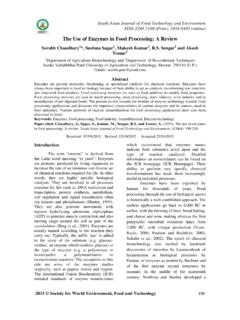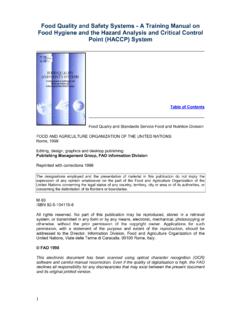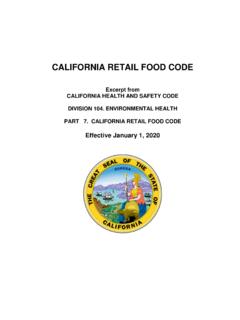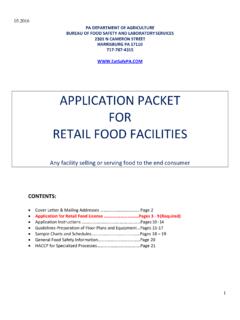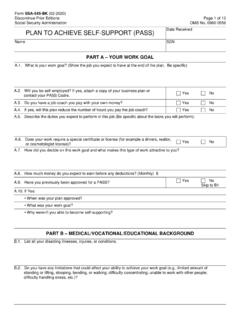Transcription of STARTING A SPECIALTY FOOD BUSINESS
1 STARTING a SPECIALTY food BUSINESS in Idaho ii A Comprehensive Guide for Idaho SPECIALTY food Processors 2018 Edition STARTING A SPECIALTY food BUSINESS TABLE OF CONTENTS 1 INTRODUCTION 2 GETTING STARTED 6 PERMITS, LICENSES AND REGULATIONS 12 SPECIAL PRODUCT CERTIFICATIONS 15 PACKAGING AND LABELING 23 MARKETING 38 FINANCIAL RESOURCES 39 APPENDIX A. BUSINESS Resources B. food processing Resources C. Idaho Health District Offices D. Other Resources Disclaimer: The information contained in this guide is for general information purposes only. While we strive to keep the information up to date and correct, we make no representations or warranties of any kind, express or implied, about the completeness, accuracy, reliability, suitability or availability with respect to this guide or the information, products, services, or related graphics contained in this guide for any purpose. Any reliance you place on such information is therefore strictly at your own risk.
2 In no event will we be liable for any loss or damage including without limitation, indirect or consequential loss or damage, or any loss or damage whatsoever arising from loss of data or profits arising out of, or in connection with, the use of this guide. This guide provides links to other websites which are not under the control of the state of Idaho. We have no control over the nature, content and availability of those sites. The inclusion of any links does not necessarily imply a recommendation or endorse the views expressed within them. STARTING a SPECIALTY food BUSINESS in Idaho 1 You have a terrific recipe for a unique salad dressing. Your family and friends have raved about the dressing for years and are now encouraging you to bottle and sell it. It s true, everyone loves your secret recipe and it has made a nice gift on more than one occasion. It sounds simple - turn your labor of love into a profit!
3 Create your own SPECIALTY foods BUSINESS . However, a lot of planning is required when STARTING your new SPECIALTY foods BUSINESS . A few questions you will need to answer are: What do I name my product? Who will purchase my product? How do I price my product? Where do I sell my product? How do I package and label my product to appeal to my target demographic? Where do I make my product commercially? How do I grow my BUSINESS ? How do I fund my new enterprise? Don t be intimidated by this list of questions. There is an abundance of information and technical advice available to you as a budding food entrepreneur. Many successful SPECIALTY foods businesses have been built in Idaho from family-favorite recipes, quality local ingredients, and a lot of hard work. The secret to success is thorough research and a commitment to quality. This handbook will discuss the major considerations involved in building a SPECIALTY foods BUSINESS in Idaho.
4 It will offer tips on how to avoid pitfalls and provide contacts in both the public and private sectors, and will be a valuable resource as you pursue your new BUSINESS venture. INTRODUCTION 2 STARTING a SPECIALTY food BUSINESS in Idaho UNIVERSITY OF IDAHO EXTENSION The University of Idaho food Technology Center is also an excellent resource. Housed with the Agribusiness Incubator in Caldwell, they offer one-on-one consulting for product and BUSINESS development and classes for developing your food product idea. Their on-site staff can walk you through every intricacy of food product development. The fully-equipped, 7,000 sq. ft. facility includes a commercial kitchen capable of producing a wide variety of different foods. Caldwell Research and Extension Center Agribusiness Incubator 1904 E. Chicago Street, Suite AB Caldwell, ID 83605 Tel (208) 459-6365 Fax: (208) 454-7612 Email: Web: University of Idaho food Technology Center 1908 E.
5 Chicago Street Caldwell, ID 83605 Tel: (208) 795-5331 Email: Web: IDAHO STATE DEPARTMENT OF AGRICULTURE The Idaho State Department of Agriculture s Market Development Division offers the following services to you: Domestic and International Market Information Trade Shows Marketing Plan Workbook Promotional Events Occasional workshops and training Potential Buyer Contacts One-on-one consultations regarding packaging, labeling, marketing, regulatory compliance, and social media training Idaho State Department of Agriculture Market Development Division 2270 Old Penitentiary Road Boise, ID 83712 Tel: (208) 332-8530 Fax: (208) 334-2879 Email: Web: GETTING STARTED STARTING a SPECIALTY food BUSINESS in Idaho 3 Where to Process Your Product Your own Kitchen Cottage food Operation Under the Idaho food Code, cottage foods are specific foods that can be made in a person's home or other designated location and sold directly to a consumer, within the state of Idaho, through farmers markets, home sales, roadside stands, online (in-state), mail order (in-state), personal delivery, or delivery service without regulatory oversight.
6 Neither the local Public Health District nor the Idaho Department of Health and Welfare require a cottage food producer to obtain a food establishment permit or license. However, as a cottage food operation, you will need to have a sales tax permit and may need a BUSINESS license depending on which city or county you live in. The Idaho Department of Health and Welfare (DHW) maintains updated information related to cottage foods on the food Protection Program's website at Cottage food producers are allowed to produce foods that are low-risk and do not require Time/Temperature Control for Safety (TCS). These types of foods are frequently referred to as non-TCS foods. The list below contains examples of non-TCS foods that are allowed (check DHW s food Protection Program website for the most current list): To determine if your product can qualify as a cottage food , contact your local Public Health District and complete the Cottage Foods Risk Assessment Form found at This should be reviewed by and signed by an Environmental Health Specialist from the local Public Health District that covers the county where your product will be processed.
7 Baked goods that do not require refrigeration Fruit jams and jellies Honey Fruit pies Breads Cakes that do not require refrigeration Pastries and cookies that do not require refrigeration Candies and confections that do not require refrigeration Dried fruits Dry herbs Seasonings and mixtures Cereals Trail mixes and granola Nuts Vinegar Popcorn and popcorn balls Cotton Candy 4 STARTING a SPECIALTY food BUSINESS in Idaho You will not be covered under the Idaho Cottage food law if any of the following apply: Your food product does not qualify as a cottage food You want to sell your products outside of the State of Idaho You want to sell your products to retailers, distributors, or brokers Your home kitchen is not suitable Commercial Kitchen Facilities Commercial kitchens are licensed facilities designed for food production. There are commercial kitchens available for use throughout the state, or you might be able to rent space in a local restaurant, church, school, or community center kitchen that has been approved by your local Health District.
8 A list of Idaho commercial kitchens can be found at in the Domestic Programs section under the Marketing tab or you can call the Idaho State Department of Agriculture at (208) 332-8530 to have one sent to you. Co-Packing As your company grows, your current processing location may not be the most convenient for developing new products or expanding product lines. Under a co-packing arrangement, you contract with an existing food processor to manufacture and package your product using your recipe and your quality specifications. To ensure a successful product launch you will want to visit the processing facility and oversee initial production runs. Shared processing Facility Another option is a shared or cooperatively-owned kitchen or processing facility which may offer a range of services, from a simple lease of common kitchen space to an opportunity to invest in a production cooperative, which enables members to pool equipment, packaging and input materials, product liability insurance, shipping costs, and even marketing and promotional expenses.
9 Cottage foods do not include: Low acid canned foods (such as canned fruits, canned vegetables, canned meat, and canned pie fillings) Fermented foods (such as cheese and yogurt) Acidified foods (such as pickled products and canned salsa) If your recipe includes one or more of these items, you will need to produce it outside of your home in a commercial kitchen. IDAHO food CODE All other food operations that do not fall under the Idaho Cottage food law must submit a written application for a food establishment license on forms provided by your local health district. For more information visit To find your local Idaho Health District Office, please refer to Appendix C. STARTING a SPECIALTY food BUSINESS in Idaho 5 PLANNING FOR GROWTH Increasing production from a single batch to commercial scale may require some modifications to your recipe and possibly the addition of stabilizers, emulsifiers, and preservatives.
10 This does not mean that your quality or taste needs to be compromised, but that adjustments may be necessary. We recommend you seek the technical advice of qualified food technologists on the safety of your ingredients, shelf life, nutritional content, and toxicology. Many of your questions can be handled over the telephone, but some require laboratory analysis. There are several privately run laboratories and registered dieticians which can assist you. You can find food processing & Laboratories Resources and a list of food processing Publications in Appendix B of this book. Some of the product quality and safety areas that you will need to consider include: Microbiological Nutritional Content Per Serving Total bacterial count E-coli Yeast and mold Staphylococcus Protein Sodium Calcium Fiber Cholesterol Phosphorus Vitamins (A, C, B1, B2) Iron 6 STARTING a SPECIALTY food BUSINESS in Idaho Health Licenses As mentioned earlier, you are not permitted to manufacture your food product in your home kitchen unless you comply with the Idaho Cottage food Law.


